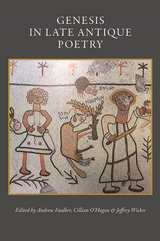3 books by Faulkner, Andrew

Genesis in Late Antique Poetry
Andrew Faulkner
Catholic University of America Press, 2022
The biblical book of Genesis stands nearly without parallel in the shared history of Judaism, Christianity, and Islam. Because of its abiding importance to late antique theology and practical life across religious boundaries, it gave rise to a wide range of literary responses. The essays in this book study an array of Jewish and Christian responses to Genesis as they took shape in specific literary forms—the unique genres of late antique poetry. While late antique and early medieval Jews and Christians did not always agree in their interpretations of Genesis, they participated broadly in a shared culture of poetic production. Some of these poetic genres paralleled one another simply as distinct examples of metered speech, while others emerged in conversation and through mutual influence. Though late antique poems developed in a variety of languages and across religious boundaries, scholarly study of late antique poetry has tended to isolate the phenomenon according to language. As a corrective to this linguistic isolation, this book initiates a comparative conversation around the Jewish and Christian poetry that emerged in late antique Aramaic, Greek, Hebrew, Latin, and Syriac. Tending equally to exegetical content and literary form, the essays in this book sit at the intersection of a variety of scholarly conversations—around the history of biblical exegesis, the formation of late antique and early medieval literature and literary culture, and the comparative study of Judaism and Christianity.
[more]

Harvard Studies in Classical Philology, Volume 105
Kathleen M. Coleman
Harvard University Press
This volume includes Carolyn Higbie, “Divide and Edit: A Brief History of Book Divisions”; Ho Kim, “Aristotle’s Hamartia Reconsidered”; Andrew Faulkner, “Callimachus and His Allusive Virgins: Delos, Hestia, and the Homeric Hymn to Aphrodite”; José M. González, “Theokritos’ Idyll 16: The Χάριτες [Kharites] and Civic Poetry”; Matthew Leigh, “Boxing and Sacrifice: Apollonius, Vergil, and Valerius”; Sviatoslav Dmitriev, “The Rhodian Loss of Caunus and Stratonicea in the 160s”; Radosław Piętka, “Trina tempestas (Carmina Einsidlensia 2.33)”; James Uden, “The Vanishing Gardens of Priapus”; Maria Ypsilanti, “Trimalchio and Fortunata as Zeus and Hera: Quarrel in the Cena and Iliad 1”; Martin Korenjak, “Ps.-Dionysius Ars Rhetorica I–VII: One Complete Treatise”; Jarrett T. Welsh, “The Grammarian C. Iulius Romanus and the Fabula Togata”; Silvio Bär, “Quintus of Smyrna and the Second Sophistic”; and Simon Price, “The Road to Conversion: The Life and Work of A. D. Nock.”
[more]

Harvard Studies in Classical Philology, Volume 106
Kathleen M. Coleman
Harvard University Press
This volume includes Natasha Bershadsky, “A Picnic, a Tomb, and a Crow: Hesiod’s Cult in the Works and Days”; Alexander Dale, “Sapphica”; Andrew Faulkner, “Fast, Famine, and Feast: Food for Thought in Callimachus’ Hymn to Demeter”; Guillermo Galán Vioque, “A New Manuscript of Classical Authors in Spain”; Jarrett T. Welsh, “The Dates of the Dramatists of the Fabula Togata”; Andrea Cucchiarelli, “Ivy and Laurel: Divine Models in Virgil’s Eclogues”; John Henkel, “Nighttime Labor: A Metapoetic Vignette Alluding to Aratus at Georgics 1.291–296”; Salvatore Monda, “The Coroebus Episode in Virgil’s Aeneid”; Mark Toher, “Herod’s Last Days”; Bart Huelsenbeck, “The Rhetorical Collection of the Elder Seneca: Textual Tradition and Traditional Text”; Robert Cowan, “Lucan’s Thunder-Box: Scatology, Epic, and Satire in Suetonius’ Vita Lucani”; Erin Sebo, “Symphosius 93.2: A New Interpretation”; Christopher P. Jones, “Imaginary Athletics in Two Followers of John Chrysostom”; and William T. Loomis and Stephen V. Tracy, “The Sterling Dow Archive: Publications, Unfinished Scholarly Work, and Epigraphical Squeezes.”
[more]
READERS
Browse our collection.
PUBLISHERS
See BiblioVault's publisher services.
STUDENT SERVICES
Files for college accessibility offices.
UChicago Accessibility Resources
home | accessibility | search | about | contact us
BiblioVault ® 2001 - 2024
The University of Chicago Press









